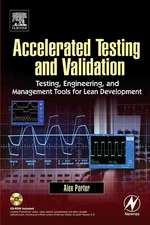Risk Analysis in the Private Sector: Advances in Experimental Medicine and Biology, cartea 220
Autor Chris Whipple, Vincent T. Covelloen Limba Engleză Paperback – 15 apr 2013
Din seria Advances in Experimental Medicine and Biology
- 9%
 Preț: 719.60 lei
Preț: 719.60 lei - 20%
 Preț: 691.93 lei
Preț: 691.93 lei - 5%
 Preț: 717.00 lei
Preț: 717.00 lei - 5%
 Preț: 716.28 lei
Preț: 716.28 lei - 5%
 Preț: 717.20 lei
Preț: 717.20 lei - 15%
 Preț: 640.24 lei
Preț: 640.24 lei - 5%
 Preț: 1113.83 lei
Preț: 1113.83 lei - 5%
 Preț: 715.71 lei
Preț: 715.71 lei - 5%
 Preț: 820.43 lei
Preț: 820.43 lei - 15%
 Preț: 641.38 lei
Preț: 641.38 lei - 5%
 Preț: 716.28 lei
Preț: 716.28 lei - 5%
 Preț: 523.99 lei
Preț: 523.99 lei - 5%
 Preț: 1031.00 lei
Preț: 1031.00 lei - 5%
 Preț: 717.00 lei
Preț: 717.00 lei - 5%
 Preț: 715.35 lei
Preț: 715.35 lei - 20%
 Preț: 1161.71 lei
Preț: 1161.71 lei - 5%
 Preț: 1170.51 lei
Preț: 1170.51 lei - 18%
 Preț: 1119.87 lei
Preț: 1119.87 lei - 5%
 Preț: 1288.48 lei
Preț: 1288.48 lei - 5%
 Preț: 1164.67 lei
Preț: 1164.67 lei - 5%
 Preț: 1101.73 lei
Preț: 1101.73 lei - 18%
 Preț: 1123.67 lei
Preț: 1123.67 lei - 5%
 Preț: 1435.64 lei
Preț: 1435.64 lei - 20%
 Preț: 1044.10 lei
Preț: 1044.10 lei - 18%
 Preț: 946.39 lei
Preț: 946.39 lei - 5%
 Preț: 292.57 lei
Preț: 292.57 lei - 18%
 Preț: 957.62 lei
Preț: 957.62 lei - 18%
 Preț: 1235.76 lei
Preț: 1235.76 lei - 5%
 Preț: 1231.55 lei
Preț: 1231.55 lei - 5%
 Preț: 1292.30 lei
Preț: 1292.30 lei - 5%
 Preț: 1102.10 lei
Preț: 1102.10 lei - 18%
 Preț: 1132.81 lei
Preț: 1132.81 lei - 5%
 Preț: 1165.19 lei
Preț: 1165.19 lei - 5%
 Preț: 1418.48 lei
Preț: 1418.48 lei - 5%
 Preț: 1305.63 lei
Preț: 1305.63 lei - 18%
 Preț: 1417.72 lei
Preț: 1417.72 lei - 18%
 Preț: 1412.99 lei
Preț: 1412.99 lei - 24%
 Preț: 806.16 lei
Preț: 806.16 lei - 18%
 Preț: 1243.29 lei
Preț: 1243.29 lei - 5%
 Preț: 1429.44 lei
Preț: 1429.44 lei - 5%
 Preț: 1618.70 lei
Preț: 1618.70 lei - 5%
 Preț: 1305.12 lei
Preț: 1305.12 lei - 18%
 Preț: 1124.92 lei
Preț: 1124.92 lei - 5%
 Preț: 1097.54 lei
Preț: 1097.54 lei - 15%
 Preț: 649.87 lei
Preț: 649.87 lei - 5%
 Preț: 1097.54 lei
Preț: 1097.54 lei - 18%
 Preț: 945.79 lei
Preț: 945.79 lei - 5%
 Preț: 1123.16 lei
Preț: 1123.16 lei
Preț: 408.37 lei
Nou
Puncte Express: 613
Preț estimativ în valută:
78.14€ • 83.56$ • 65.15£
78.14€ • 83.56$ • 65.15£
Carte tipărită la comandă
Livrare economică 18 aprilie-02 mai
Preluare comenzi: 021 569.72.76
Specificații
ISBN-13: 9781461294962
ISBN-10: 1461294967
Pagini: 520
Ilustrații: X, 506 p.
Dimensiuni: 178 x 254 x 27 mm
Greutate: 0.89 kg
Ediția:Softcover reprint of the original 1st ed. 1985
Editura: Springer Us
Colecția Springer
Seria Advances in Experimental Medicine and Biology
Locul publicării:New York, NY, United States
ISBN-10: 1461294967
Pagini: 520
Ilustrații: X, 506 p.
Dimensiuni: 178 x 254 x 27 mm
Greutate: 0.89 kg
Ediția:Softcover reprint of the original 1st ed. 1985
Editura: Springer Us
Colecția Springer
Seria Advances in Experimental Medicine and Biology
Locul publicării:New York, NY, United States
Public țintă
ResearchCuprins
Section 1: Chemical Risk Management.- Chemical Risk Management: Introduction.- A Generic Environmental Health Risk Model for Ranking the Toxic By-Products of Energy Systems.- Private Sector Response Patterns to Risks from Chemicals.- The Control of the Use Pattern and the Life of Metals for Risk Management: The Case of Lead.- Acceptable Levels of Risk in Setting Chemical Standards.- Integrated Risk Index System.- Section 2: Occupational Risk Analysis.- Occupational Risk Analysis: Introduction.- Occupational Health and Safety Risk Analysis for Oil Shale.- Quantitative Risk Assessment for Inorganic Arsenic: Determining a Significant Risk.- Analysis of Agency Estimates of Risk for Carcinogenic Agents.- A Training Program on Hazardous Materials for Non-Scientists.- Inorganic Arsenic: Importance of Accurate Exposure Characterization for Risk Assessment.- Lower-Bound Benefits of Air Pollution Reductions in the Munich Metropolitan Area (MMA).- Environmental Risk Assessment in the Energy Field: Issues and Application to Policy.- Risk Management in Household Detergent Control.- Section 3: Ethics and Values in Risk Analysis.- Ethics and Values in Risk Analysis: Introduction.- Product Liability: When Does the Individual Assume the Risk?.- Three Types of Risk Assessment A Methodological Analysis.- Legitimating Private Sector Risk Analysis: A U.S.-European Comparison.- Are Regulations Needed to Hold Experts Accountable for Contributing “Biased” Briefs of Reports That Affect Public Policies.- Protecting Workers, Protecting Publics: The Ethics of Differential Protection.- The Chemical Industry’s View of Risk Assessment.- Section 4: Risk Analysis and Risk Management: Issues, Methods, and Case Studies.- Risk Analysis and Risk Management.- Dietary Carcinogens and Anticarcinogens:Oxygen Radicals and Degenerative Diseases.- Institutional Initiatives for Risk Management.- Risk Assessment: The Reality of Uncertainty.- The Statistical Correlation Model for Common Cause Failures.- Turbine Rotor Reliability: A Probability Model for Brittle Fracture.- A Guide for Reliability and Maintainability Data Acquisition.- The Application of Risk-Based Cost-Benefit Analysis in the Assessment of Acceptable Public Safety for Nuclear Power Plants.- Insurance Market Assessment of Technological Risks.- The “Third Made”: Technology Regulation by Insurance.- Environmental Impairment Liability (EIL) Insurance Risk Assessment Surveys.- Risk Compensation, Behavior Choice, and the Enforcement of Drunk Driving Statutes.- Cognitive Maps of Risk and Benefit Perceptions.- Warning Systems and Risk Reduction.- On Determining Public Acceptability of Risk.






